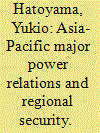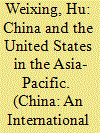| Srl | Item |
| 1 |
ID:
153402


|
|
|
|
|
| Summary/Abstract |
This article investigates US responses to President Xi Jinping’s new model of major power relations in the context of American reflections on the engagement policy toward China. It argues that while the Obama administration endorsed the goal of avoiding confrontation between the two countries, it disagreed about how to reach the goal. Facing pressure to stand up against China due to the perceived failure of engagement policy, the administration became increasingly frank on the competition with China. The Sino-US strategic mistrust intensified and the chances of mishaps triggering an escalation increased when President Obama turned the presidency to Donald Trump.
|
|
|
|
|
|
|
|
|
|
|
|
|
|
|
|
| 2 |
ID:
137356


|
|
|
|
|
| Summary/Abstract |
I’m delighted once again that the 3rd World Peace Forum, under the leadership of President Tang Jiaxuan, is being held here at Tsinghua University. I would like to thank University president, Dr. Cheng Jining for granting me this opportunity to speak at this event for the third consecutive year. Last year, I was deeply honored to be awarded the title of Guest Professor. It is truly a great pleasure to return here to speak to you all once again, this time on the topic of Asia-Pacific Major Power Relations and Regional Security. When I was appointed Prime Minister of Japan in 2009 I published an essay in the magazine Voice. In the essay, I wrote the following passage: “As a result of the failure of the Iraq war and the financial crisis, the era of US globalism is coming to an end and … we are moving away from a unipolar world led by the US towards an era of multi-polarity.” I continued by writing “I believe that the East Asian region … must be recognized as Japan’s basic sphere of being.” In the five years since then, the political situation in Japan has changed considerably but my basic stance on this matter remains the same.
|
|
|
|
|
|
|
|
|
|
|
|
|
|
|
|
| 3 |
ID:
152277


|
|
|
|
|
| Summary/Abstract |
The relationship between China and the United States is one between a rising power and an established power. Whether China is a revisionist power or a status quo power depends on how China and the United States get on with one another in the Asia-Pacific region. The US pivot to Asia and China’s rapid rise has created new dynamics for China–US relations in the region. A changing China–US relationship is also reshaping the strategic landscapes in the Asia-Pacific. US policy towards China has oscillated between containment and engagement since the end of the Cold War. In recent years, this policy has increasingly focused on the “engage but hedge” logic. The Obama administration’s pivot to Asia has rebalanced the focus of the “engage but hedge” policy and put more emphasis on political, economic and security competition with China in the Asia-Pacific region. Despite Xi Jinping’s proposal for a “new model of major power relations” between China and the United States, both countries are actually entering into a “new normal” type of power rivalry in the Asia-Pacific region.
|
|
|
|
|
|
|
|
|
|
|
|
|
|
|
|